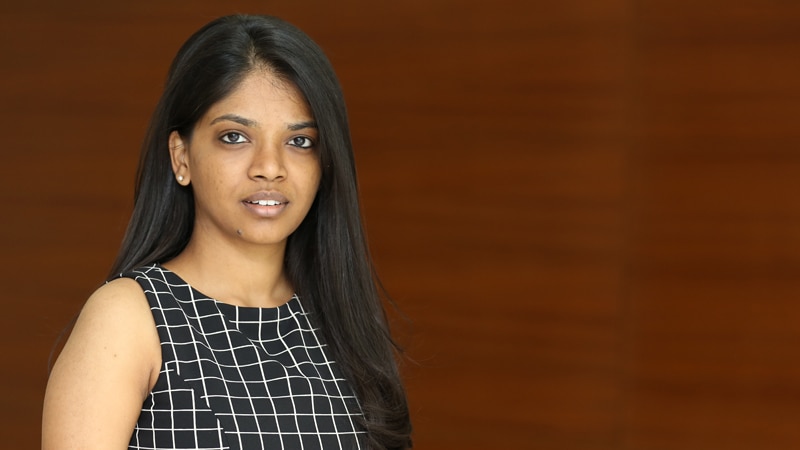Ask the Engineer: Kaaveea

Kaaveea, an engineer in Goldman Sachs’ Bengaluru office, tells us why she chose a career in financial services, and how she is helping young people develop career paths in engineering.
How did you become interested in engineering?
I always had an affinity for math and science as a child, and liked solving puzzles. My dad, seeing my interest, introduced me to coding as a teenager and I found I really liked it. I continued to pursue this interest in college, and graduated with a Bachelor’s degree in Computer Science Engineering from PSG College of Technology, Coimbatore in 2012.
Q: What led you to a career at Goldman Sachs?
In my final year of college, Goldman Sachs came to my campus as part of a recruiting day. They conducted interviews during the event that included challenges such as designing algorithms, solving puzzles and modeling database schemas. I realized during these interviews that, although Goldman Sachs was a finance company, the firm was committed to technology and offered the opportunity to solve technology problems that would challenge me in my career. Moreover, coming from a computer science background and having an interest in areas like theory of computing and data structures, I felt that I would fit into the environment at the firm and be able to work with others who had the same interests.
Q: How would you describe your career so far, and what are you currently working on?
After graduation, I joined post-execution platform technology covering the Securities Division in asset servicing. I feel fortunate as I have been with my current team since day one. I’ve had the opportunity to work on a range of interesting projects, from those that are complex and technology-rich to functional challenges.
I work very closely with the business side of the division, which has been great from an exposure and development standpoint. When I joined the firm in 2012, my team was over 10 years old and had many legacy systems; I really felt that I could use my problem-solving and coding skills to help improve those systems. One area where I feel I’ve added value is in automating manually-intensive processes. Many of these projects involve gathering the process requirements, finding ways to improve parts or even the entire workflow and facilitating automation.
Currently, I am working on the automation of financial statement instructions to agent banks. This is a process that is still quite manual and therefore has potential risks that can be eliminated through automation to deliver a smoother, more efficient process.
Q: Can you tell us about your experience as a female engineer? How has this shaped your perspective?
I joined the firm right after college, and my transition wasn’t difficult as my team was extremely welcoming I am also involved in a number of women’s initiatives at the firm, including our Women in Technology initiative. Last year, I served as a mentor for the Technovation program, which is focused on inspiring young girls to solve real-life problems using technology. I was responsible for coaching five middle school girls, who made it to the world pitch final event and won the People’s Choice Award, which was so exciting and a great accomplishment for them. During the program, I could really see a rise in the girls’ confidence levels and their understanding of technology, which I found to be an extremely rewarding experience.
Q: What advice do you have for engineers thinking about pursuing a career in financial services?
Financial services – like most product-based industries – constantly invest in automation and leverage new technologies to keep ahead of the competition. As engineers, we can really make a difference in this space and help the business to run more smoothly.
When I first joined I didn’t know much about the finance industry. Understanding that I had a knowledge gap, I spent a lot of time learning from the functional experts of the team as well reading a few books and taking advantage of firm-provided trainings that helped me understand concepts in my area of focus. For someone starting out who might not have an extensive background in finance, I would recommend that they begin with their colleagues, learning what they can from them and from their team. Also, be curious! Inquire about a process or system if something doesn’t make sense to you – it might just solve someone’s problem.

